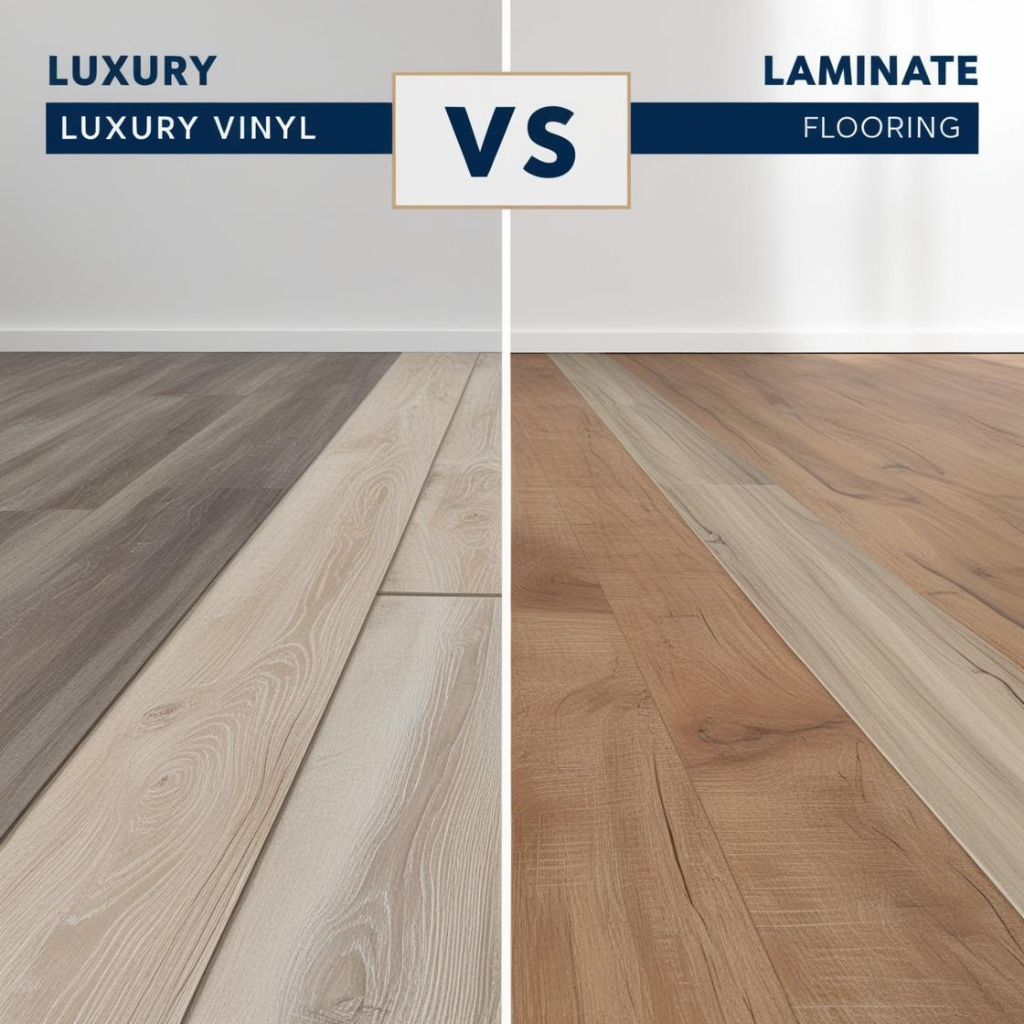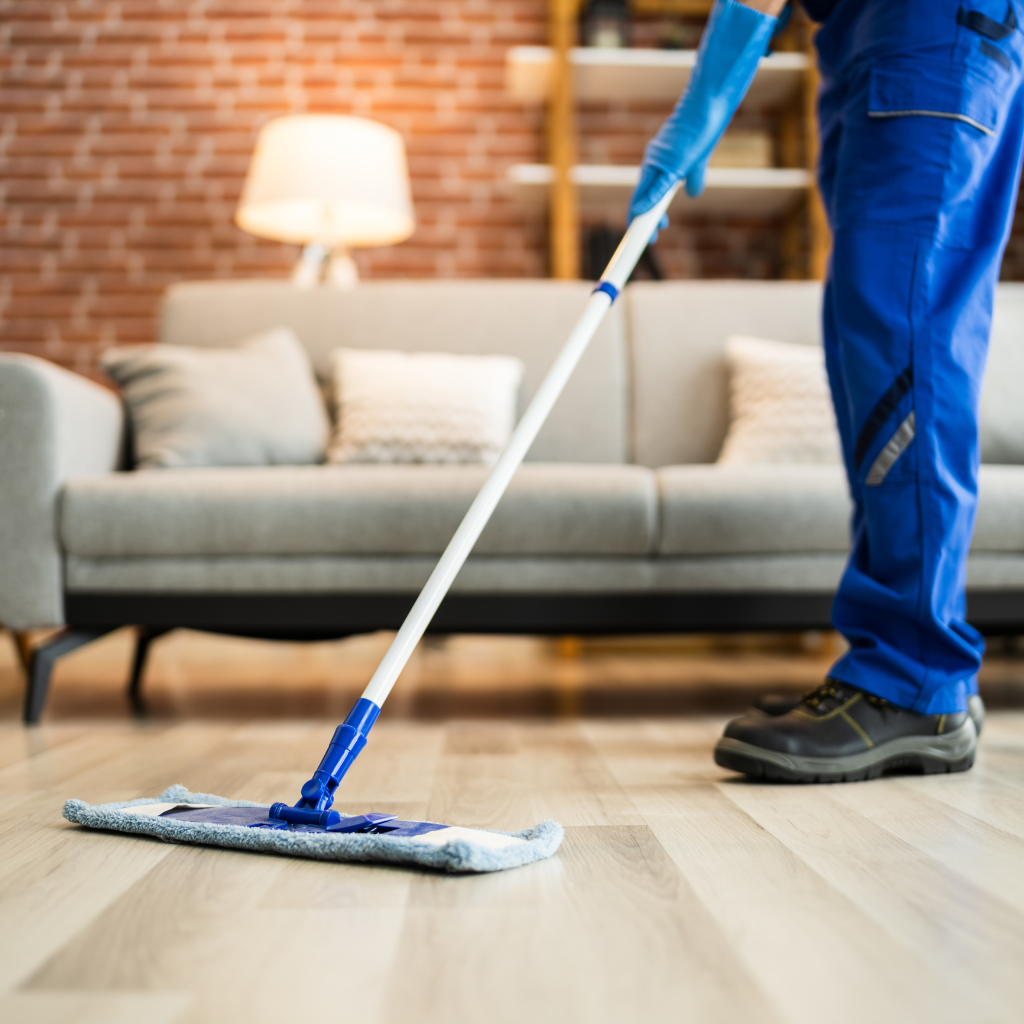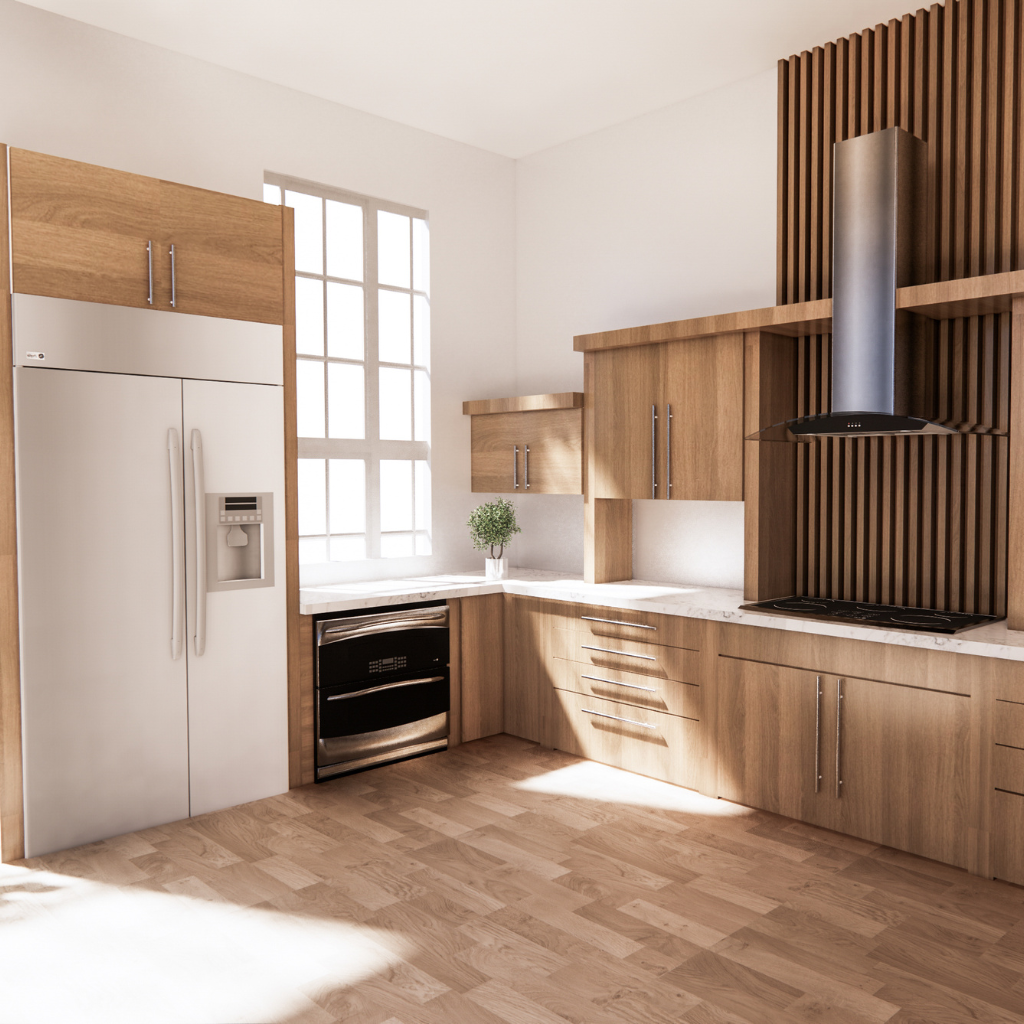Vinyl flooring offers an array of options, from luxury vinyl and vinyl planks mimicking natural materials to durable and water-resistant sheet vinyl and luxury vinyl tiles (LVT). Tailored for modern homes, it is designed to provide aesthetic elegance alongside practical benefits such as cost-effectiveness and easy maintenance. This variety guarantees that there is a perfect choice for every room, enhancing the home's character while promising extended durability. Discover the ideal vinyl flooring to elevate your interior space.
Key Takeaways
Vinyl flooring, a versatile and stylish option, presents itself in its several layers of distinct types tailored to enhance any interior.
From the plush elegance of luxury vinyl, known for its realistic textures and resilience, to the practicality of vinyl plank, sheet, and luxury vinyl tile (LVT), each category meets unique aesthetic and functional demands. For those who desire the look of natural materials like ceramic or stone without the cost or maintenance, tile-effect vinyl flooring offers an ideal solution that blends visual charm with durability.
This variety allows homeowners to find the perfect match for their decor trends and lifestyle needs, ensuring both durability and visual appeal.
Several types of vinyl flooring cater to both aesthetic preferences and functional needs, making it a versatile choice for modern homes.
Here are the main types available:

Among the myriad choices for home flooring, luxury vinyl stands out due to its superior aesthetics and practical benefits. Luxury vinyl flooring offers an impressive range of styles and designs, mimicking natural materials with astonishing accuracy but at a fraction of the cost. Here's a detailed look at the different types of luxury vinyl flooring:
| Type | Key Feature | Best For |
|---|---|---|
| Luxury Vinyl Planks | Realistic textures | Living rooms, bedrooms |
| Luxury Vinyl Tiles | Easy to replace | Kitchens, bathrooms |
| Waterproof Luxury Vinyl | Fully waterproof | Basements, utility room |
| Rigid Core Luxury Vinyl | Stable and sturdy | High traffic areas |
| Peel & Stick Luxury Vinyl | DIY friendly | Temporary spaces, rentals |
Each type boasts a durable wear layer and a waterproof surface, ensuring longevity and ease of maintenance in various living environments.
Luxury vinyl flooring offers an appealing alternative to traditional hardwood, combining aesthetic versatility with practical benefits.
It stands out in the modern market with its ability to mimic high-end materials while providing a cost-effective solution for stylish, durable floors.
When comparing luxury vinyl to laminate, discerning homeowners weigh factors like resilience, maintenance, and overall value to determine the best fit for their living spaces.
Vinyl flooring offers a compelling alternative to hardwood, blending aesthetic appeal with unparalleled durability.
Here are three key reasons why homeowners might prefer vinyl over traditional wood flooring:
Given the increasing popularity of luxury vinyl tile (LVT) among homeowners, its comparison with other vinyl flooring options reveals distinct advantages that cater to both style and functionality. Luxury vinyl tile, a top contender in vinyl flooring products, offers a seamless finish with unique patterns that mimic natural materials. The aesthetic appeal is matched by its resilient flooring qualities, making it an ideal choice for active spaces.
| Feature | Luxury Vinyl Tile | Other Flooring Types |
|---|---|---|
| Installation | Easy, often with self adhesive vinyl | Varies, often complex |
| Maintenance | Low; simple cleaning | Higher; often specialised |
| Durability | High; resists wear | Moderate to high |
| Aesthetic | Customisable; individual tiles | Standardised options |
Luxury vinyl tile provides a stylish yet practical solution with a variety of vinyl options that guarantee long-lasting satisfaction.
After exploring the distinctive benefits of luxury vinyl tile, it becomes pertinent to compare it with laminate flooring, an equally popular choice among homeowners.
Here's a concise breakdown:
When considering the installation of vinyl flooring, homeowners face a choice between the seamless click vinyl tiles and the versatile self-adhesive vinyl tiles, each catering to different aesthetic and practical preferences.
For the DIY enthusiast, mastering a step-by-step installation process is vital to guarantee a flawless finish and prevent common pitfalls such as misalignment or inadequate securing.
It is essential to be aware of these potential errors early in the planning stage to maintain the longevity and appearance of this trendy flooring option.
Installing vinyl flooring, particularly the click vinyl tiles, has gained popularity among DIY enthusiasts due to its blend of aesthetic appeal, durability, and ease of installation.
This flooring solution is revered not only for its visual grace but also for its practicality in homes.
Here's a detailed guide to installing vinyl flooring:
This straightforward approach allows even novices to achieve professional-looking results.
Choosing the correct type of vinyl flooring for your home involves weighing the merits of click flooring against self-adhesive vinyl tiles.
Click flooring, with its interlocking design, suits those who desire a seamless yet robust aesthetic. It caters to more prominent spaces where long-lasting durability is paramount.
Conversely, self-adhesive vinyl tiles offer a practical and cost-effective solution, ideal for quick updates or smaller areas. These tiles simplify installation, allowing for an immediate transformation of any room.
When choosing a vinyl type, consider the specific needs of your space. Both options extend a variety of styles, from modern planks and tiles to traditional vinyl sheet flooring.
Your final choice among different vinyl flooring choices should enhance both function and fashion in your living environment.
As homeowners begin the installation of vinyl flooring, including click vinyl tiles, meticulous attention to detail is essential to avoid costly errors.
The allure of different types of vinyl flooring, from sheet vinyl to luxury tiles, means that correct installation is critical to maintaining both appearance and functionality.
Here are key missteps to avoid:
Maintaining the lustre of vinyl flooring hinges on both the methods and products used in its upkeep.
Exploring top tips for keeping vinyl floors spotless guarantees that this durable surface not only shines but also withstands the test of time and trend.
It is equally important to be aware of common cleaning mistakes that can dull or damage the sleek finish that vinyl flooring is renowned for.

Keeping a vinyl floor spotless enhances not only its appearance but also its longevity, making it a wise investment for stylish, modern homes.
Here are three key tips for maintaining the pristine condition of your vinyl flooring:
Several specialised products are vital for maintaining the lustre and longevity of vinyl flooring, which has become a favoured choice among discerning homeowners.
For those investing in this affordable flooring option, it's essential to select cleaners that cater specifically to the three types of vinyl flooring available. Regular care typically involves occasional mopping with a pH-neutral cleaner to preserve the aesthetic appeal without damaging the surface.
High-quality commercial products designed for vinyl offer a residue-free finish, guaranteeing the flooring remains spotless and shiny. Additionally, for newer installations, certain polishes can enhance the flooring's innate sheen.
These maintenance steps guarantee that the best vinyl flooring retains its allure, proving both a practical and stylish investment.
Many homeowners, enthusiastic about preserving the sleek look of their vinyl flooring, often inadvertently commit common cleaning errors that can diminish its appearance and durability.
Here are the key mistakes to avoid:
Neglecting these can lead to premature wear and loss of sound insulation.
When considering vinyl flooring for areas prone to damp such as kitchens and bathrooms, its resilience and waterproof qualities make it an appealing choice.
Comparing vinyl to traditional stone or ceramic tiles highlights its practical advantages, including ease of installation and maintenance.
However, the suitability of vinyl in high-traffic zones necessitates a closer look at its durability and long-term performance in such demanding environments.
Most homeowners recognise vinyl flooring as an ideal choice for wet areas like kitchens and bathrooms due to its remarkable water-resistant qualities.
The advantages of vinyl flooring in these settings are numerous, particularly when considering the diverse options available, such as premium vinyl and loose-lay vinyl products.
Advantages of Vinyl Flooring in Wet Areas:
While vinyl tiles offer remarkable versatility and durability, comparing them to traditional stone and ceramic tiles reveals distinct differences, particularly regarding aesthetic impact and long-term performance in kitchens and bathrooms.
Vinyl flooring, with its modern iterations, can mimic the visual appeal of natural stone or real wood, providing a diverse selection to suit various decor styles. However, stone or ceramic tiles hold an edge in authentic texture and richness that some homeowners may prefer for their unique features.
Despite this, the moisture resistance and ease of maintenance of vinyl make it a formidable choice in areas prone to spills and humidity. Each flooring type holds its merit, catering to different priorities and aesthetic preferences in home design.

Although vinyl flooring is celebrated for its versatility and ease of maintenance, its suitability for high-traffic areas such as kitchens and bathrooms warrants a closer examination of its pros and cons.
When deciding on flooring for these spaces, consider the following:
To summarise, vinyl flooring presents a versatile and stylish option suitable for modern homes, effortlessly blending aesthetics with functionality. Whether opting for luxury vinyl in living spaces or water-resistant versions in kitchens and bathrooms, the variety guarantees there's a perfect match for every interior design trend. Proper installation and maintenance will preserve its allure, making sheet vinyl flooring not only a practical choice but also a long-lasting one that enhances the beauty and comfort of home environments.